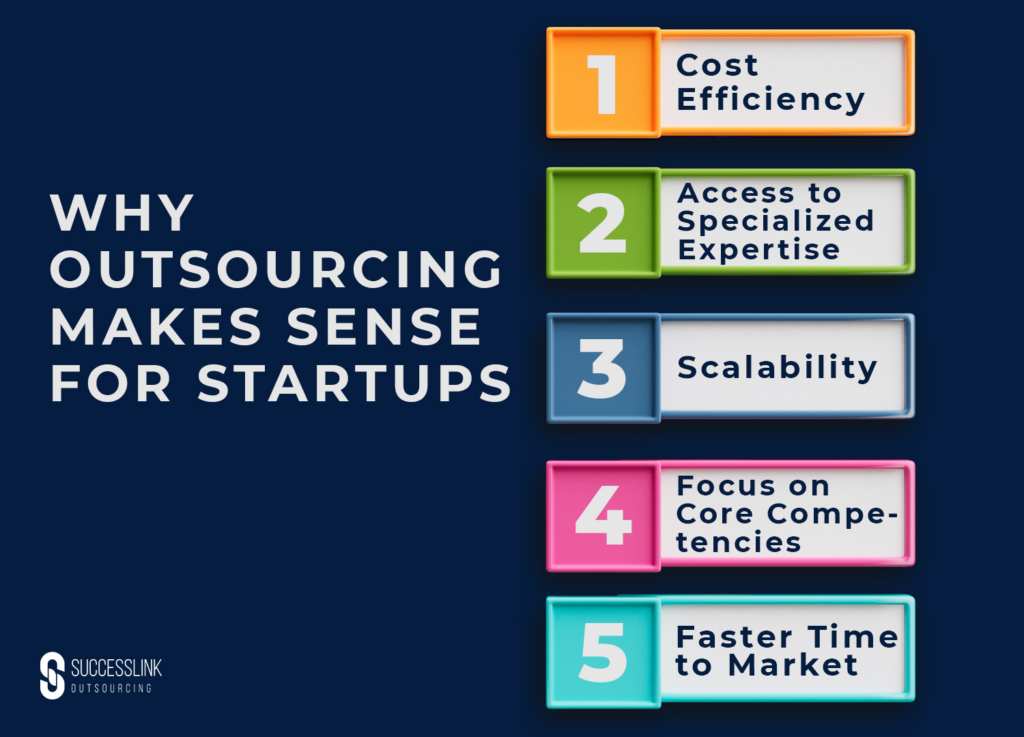In the high-stakes world of startups, every decision can either propel you forward or set you back. For lean startups, where resources are often limited, outsourcing offers a strategic way to maximize efficiency, minimize costs, and focus on core business goals.
This guide delves into why and how outsourcing can be a game-changer for startups and offers actionable tips to get started.

Why Outsourcing Makes Sense for Startups
Startups are inherently agile but resource-constrained. They need to innovate quickly, bring products to market faster, and operate efficiently. Here are some key reasons outsourcing aligns with these needs:
1. Cost Efficiency
Building an in-house team can be expensive, especially when you factor in salaries, benefits, training, and infrastructure. Outsourcing allows you to access skilled professionals without the overhead costs. For example, instead of hiring a full-time accountant, you can outsource your financial tasks to a virtual CFO or a freelance accountant.
2. Access to Specialized Expertise
Outsourcing connects startups with experts who specialize in niche areas. Whether it’s digital marketing, software development, customer service, or legal compliance, you can leverage the expertise of seasoned professionals without committing to a long-term hire.
3. Scalability
Outsourcing offers flexibility. As your startup grows, you can scale your outsourced services up or down based on demand. This agility is particularly valuable during periods of rapid growth or fluctuating workloads.
4. Focus on Core Competencies
By outsourcing non-core tasks, your team can focus on what truly matters: developing your product, enhancing customer experiences, and driving innovation. For instance, delegating IT support to an external provider frees up time for your tech team to work on product development.
5. Faster Time to Market
In today’s competitive landscape, speed is crucial. Outsourcing enables you to tap into ready-to-go resources and expertise, reducing the time it takes to execute projects and launch products.

Common Areas Startups Outsource
Startups can outsource almost any function, but some areas are particularly well-suited for external support:
1. IT and Software Development
From building websites to developing mobile apps, IT outsourcing is one of the most common practices among startups. External development teams bring technical expertise and can often deliver faster and more cost-effectively.
2. Digital Marketing
Marketing agencies and freelancers can manage your social media, SEO, content marketing, and paid advertising. These experts stay updated on the latest trends and algorithms, ensuring your brand stays competitive.
3. Customer Support
Outsourcing customer service to specialized call centers or virtual assistants ensures your customers receive prompt and professional support, even outside traditional working hours.
4. Accounting and Finance
Tasks like bookkeeping, payroll, tax preparation, and financial planning can be outsourced to professionals who ensure accuracy and compliance.
5. Human Resources
HR outsourcing firms can manage recruitment, employee onboarding, benefits administration, and compliance with labor laws, saving you time and resources.
6. Administrative Tasks
Virtual assistants can handle tasks like email management, scheduling, data entry, and research, freeing up your team to focus on strategic initiatives.

How to Maximize the Benefits of Outsourcing
While outsourcing offers numerous advantages, its success depends on how well you manage the process. Here are some tips to make the most of your outsourcing partnerships:
1. Define Your Goals and Needs
Before outsourcing, identify the tasks or functions you need help with and define your objectives. What do you hope to achieve by outsourcing? Clear goals ensure alignment with your external partners.
2. Choose the Right Partner
Not all outsourcing providers are created equal. Research potential partners, review their portfolios, and check references. Look for providers with experience in your industry and a proven track record of success.
3. Communicate Clearly
Effective communication is critical for a successful outsourcing relationship. Clearly outline your expectations, deliverables, timelines, and budget. Regular check-ins and updates can help keep everyone on the same page.
4. Start Small
If you’re new to outsourcing, start with a small, low-risk project to test the waters. This approach allows you to evaluate the provider’s performance before committing to a larger engagement.
5. Leverage Technology
Use project management tools, communication platforms, and collaboration software to streamline workflows and stay connected with your outsourcing partners. Tools like Trello, Asana, and Slack can be invaluable.
6. Focus on Building Relationships
Treat your outsourcing partners as extensions of your team. Foster a collaborative relationship based on trust and mutual respect. A strong partnership can lead to better outcomes and long-term success.

Potential Challenges and How to Overcome Them
While outsourcing offers numerous benefits, it’s not without its challenges. Being aware of these issues and addressing them proactively can ensure a smoother experience.
1. Cultural and Communication Barriers
Working with teams in different time zones or cultures can lead to misunderstandings. Address this by setting clear communication protocols and using tools that support seamless collaboration.
2. Quality Concerns
There’s always a risk that outsourced work may not meet your standards. Mitigate this by setting clear quality benchmarks and conducting regular performance reviews.
3. Data Security Risks
Sharing sensitive information with external providers can pose security risks. Protect your data by using secure platforms, signing non-disclosure agreements (NDAs), and ensuring compliance with data protection regulations.
4. Dependency on External Providers
Over-reliance on outsourcing can be risky if a provider fails to deliver. Diversify your outsourcing partnerships and maintain some in-house expertise for critical functions.

Success Stories: How Startups Have Thrived Through Outsourcing
Many successful startups have used outsourcing as a stepping stone to scale their businesses. Companies like Slack, WhatsApp, and Alibaba leveraged outsourcing to access top-tier talent and streamline operations during their early stages.
Slack: Building an MVP
Slack outsourced the design and development of its mobile app—a decision that allowed the company to focus on refining its product vision. The result? A polished, user-friendly app that quickly gained traction.
WhatsApp: Lean Operations
WhatsApp kept its core team small by outsourcing customer support and other non-core functions. This lean approach enabled the company to focus on delivering a seamless messaging experience to its users.
Alibaba: Scaling Globally
Alibaba outsourced website development to a U.S.-based team during its early days. This move allowed the company to build a robust e-commerce platform and scale globally without straining its internal resources.

Getting Started with Outsourcing
Ready to take the plunge into outsourcing? Follow these steps to get started:
- Identify the functions or tasks you want to outsource.
- Set a budget and prioritize tasks based on impact and urgency.
- Research and shortlist potential outsourcing partners.
- Start with a pilot project to evaluate performance.
- Build a long-term strategy for managing outsourcing relationships.
Partner with SuccessLink Outsourcing
Outsourcing can be a transformative strategy for lean startups, but finding the right partner is crucial. SuccessLink Outsourcing specializes in providing tailored solutions that help startups optimize their resources and achieve their goals. From IT and customer support to digital marketing and administrative tasks, SuccessLink has the expertise to support your growth journey.
Ready to take your startup to the next level? Contact SuccessLink Outsourcing today and discover how outsourcing can unlock your startup’s full potential.

